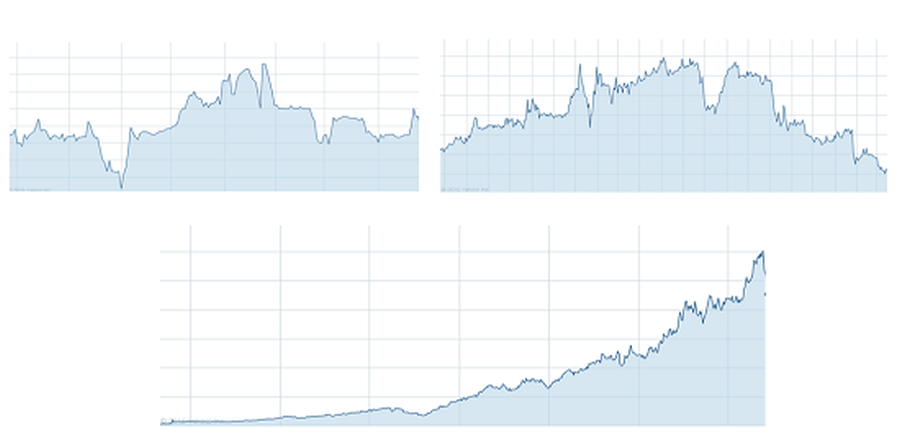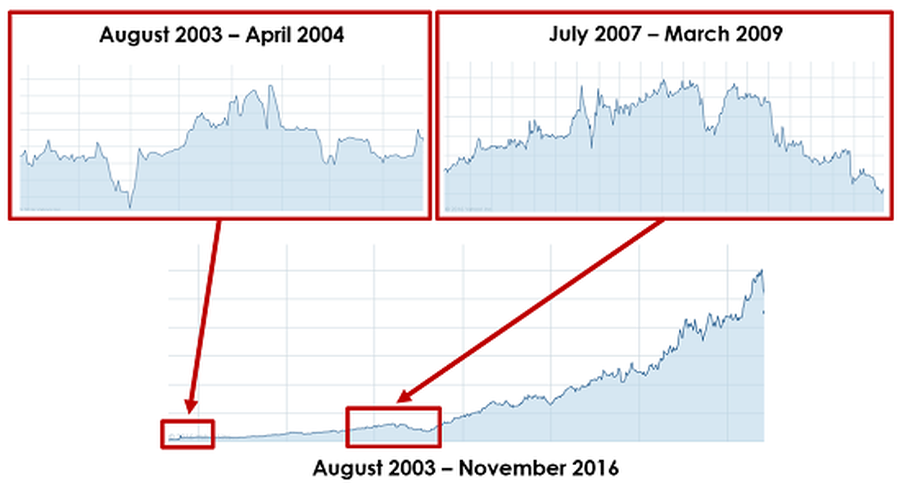Do you know how Ben Graham, the father of value investing, used to open his famous course at Columbia? According to one of his students, Marshall Weinberg, this is what Graham said at the very beginning: “If you want to make money on Wall Street, you must have the proper psychological attitude. No one expresses it better than Spinoza, the philosopher. Spinoza said you must look at things in the aspect of eternity.” Before elaborating on the importance of these lines, let me invite you to take a quick test.
Vishal Khandelwal teaches value investing in India, and he has some thought-provoking slides, two of which we are about to use here. First, look at these charts and write down which of the three stocks seems to be the best in terms of performance.
The obvious answer is the third, which looks like a one-way ride up. At this point, Vishal reveals to his students that the first two charts are just short periods in the third stock’s long journey. See it for yourself!
What does this have to teach us? In the long journey of the stock of a high-quality business, the short-term price fluctuations that make people nervous are non-events. In the larger scheme of things, most of what worries us is of relative insignificance, and this holds true for all areas of our lives.
After having reached thousands of people with my books, courses, and newsletters on investing, I’m widely aware that most people hate short-term underperformance, so they tend to zoom in on the charts and focus on the short periods instead of the long journey. If investment managers (or newsletter providers) underperform for six months, they start to get questions about the efficacy of their strategy. If the underperformance continues longer, those questions get louder, and by the time the bad period reaches five years, there won’t be many clients left. The problem is that investors try to match long-term strategies with a short-term time horizon and assume that if a strategy doesn’t work over three years, it doesn’t work long term. (Factually incorrect!)
Let me clear this up for you with an example, as this is the single most important reason why most people have difficulty following evidence-based investment approaches like the FALCON Method. Value stocks (those that are priced cheap based on various valuation metrics) tend to outperform the market in the long run. This is a fact that is not to be disputed by anyone who has studied the historical data. Having read this proven statement on long-term performance, would you be upset if your carefully constructed value portfolio underperformed the market in any single year? You shouldn’t be, as this tends to happen 37% of the time, according to the data compiled by author and investor Larry E. Swedroe. In fact, we are currently in a period where the value approach has underperformed for a long time, and statistics show that even this is perfectly normal. The longer the horizon, the lower the odds of underperformance, but it can still happen at horizons of 20 years! According to Swedroe, the value factor underperforms in 14% of ten-year periods, so staying the course during that type of extended underperformance is required to benefit from the long-term outperformance of the approach. Most people can’t do that, and that is why factor investing is much harder than many think. After all, when it comes to judging the performance of an investment strategy, most people believe that three years is a long time, five years is a very long time, and ten years is an eternity. When Ben Graham used the word eternity, he must have had something different in mind.
Investors get paid for experiencing pain. If a certain approach worked all the time, everyone would follow it, and it would eventually stop working. The pain you experience in pursuing a strategy is the price of admission to get its long-term outperformance. Periods of underperformance are part and parcel of the game. Adopting this mindset would most certainly help investors maximize their long-term returns, although I’m not too optimistic about the possibility of this ever happening on a large scale.
Now it’s Mark Hulbert’s turn to draw your attention to another important issue. He has been tracking the advice of more than 160 financial newsletters since 1980, so he does know a thing or two about this industry and its subscribers. Here’s his question: Which of the following two advisers would you more likely follow? (A) An adviser with a decent but unspectacular track record who merely matches the market’s return when it’s going up but loses less when it is declining? (B) Another adviser at the top of the performance sweepstakes, but who suffers big losses in a bear market? Hulbert says, “If you’re like the typical investor, you’d jump for the second one. Yet the first is more likely to help you reach your long-term financial goals. That’s because the key to long-term financial success is sticking with an adviser or strategy through thick and thin. And most investors who follow high-flying advisers end up discovering that they don’t have the level of commitment and intestinal fortitude that are required. As a result, most investors who start following such advisers get rid of them at or near the end of the next bear market. As a result, they suffer almost all of those advisers’ bear market losses yet benefit from only a fraction of their bull market potential. That’s why the first, less glamorous, adviser is to be preferred. Even though his track record appears to be inferior, you most likely will make more money following him over the long term than by going with the one whose track record appears to be superior. To put this another way: Slow and steady wins the race. Most investors know all this already. And yet, they continue to prefer advisers who are like the second one above. Why? Because they’re addicted to excitement.”
Short-termism and excitement addiction undermine your investment performance. You can subscribe to an evidence-based approach, the factors of which have been proven to work for decades (if not centuries), yet, you will most likely abandon it if you keep asking questions about the short-term performance. This is by no means an excuse in disguise to defend the FALCON Method since the last time I looked at the data, our results were respectable.
Do you know what conclusion I draw from these stats? Absolutely nothing! This is a meaningless snapshot, just like looking at the score of a football match in the fifth minute. The odds are on our side, and you don’t need these interim results to be confident of this. (Still, getting to know our underlying stock selection process is a great first step to build up your conviction.)
The best advice I can give you is to zoom out: forget your portfolio’s daily, monthly, and even annual performance! Focus instead on the process and its underlying factors.
Nothing spectacular will happen with the FALCON Method in the coming years, so seek entertainment and excitement elsewhere. “Investing shouldn’t be about glamour,” as Howard Marks puts it, and when he speaks, we all should listen. Buffett states, “When I see memos from Howard Marks in my mail, they’re the first thing I open and read. I always learn something.”
“Thoughtful investors can toil in obscurity, achieving solid gains in the good years and losing less than others in the bad. They avoid sharing in the riskiest behavior because they’re aware of how much they don’t know and have their egos in check. This, in my opinion, is the greatest formula for long-term wealth creation—but it doesn’t provide much ego gratification in the short run. It’s just not that glamorous to follow a path that emphasizes humility, prudence, and risk control. Of course, investing shouldn’t be about glamour, but often it is.” These thoughts from Howard Marks highlight how I aim to manage my investing operations along with the FALCON Method.
Want to learn more about our stock ranking methodology and evidence-based investment approach? Start with this blog post!


